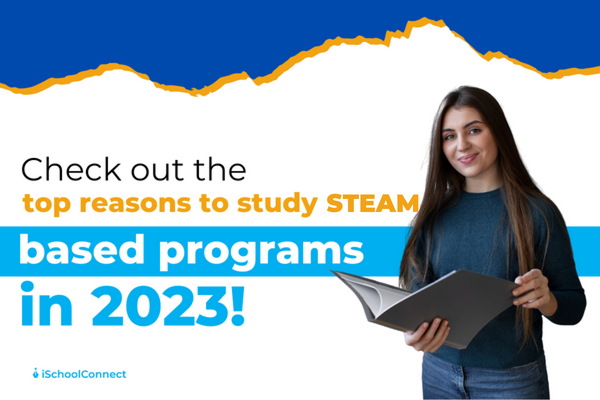Table of Contents
- STEAM-based programs | Are they necessary?
- What is STEAM education?
- Top 10 reasons to pursue STEAM-based programs
- 1. Prepares for the future
- 2. Develops critical thinking and problem-solving skills
- 3. Encourages creativity and innovation
- 4. Builds strong communication and collaboration skills
- 5. Gain hands-on experience
- 6. Engages with real-world challenges
- 7. Increases technological literacy
- 8. Prepares for college and career readiness
- 9. Addresses the skills gap
- 10. Promotes diversity and inclusion
- The way forward
- Key takeaways
- FAQ
STEAM-based programs | Are they necessary?
In today’s fast-paced world, where technology and innovation are changing the landscape of every industry, it is crucial to have a workforce that is equipped with the skills and knowledge required to tackle the challenges of the future. Here, STEAM education comes into play. Whether it is medicine, finance, or engineering, each field has its own merits. But if you want to be future-proof and gain an extra edge in the job market, then pursuing STEAM-based programs is the way forward! STEAM education not only gives you expertise in multiple disciplines but also encourages lateral thinking, which helps create innovative solutions for problems faced by our society.
What is STEAM education?
STEAM programs are educational programs that integrate science, technology, engineering, art, and mathematics into a cohesive curriculum. The acronym STEAM stands for Science, Technology, Engineering, Arts, and Mathematics. These programs aim to teach critical thinking skills, problem-solving, creativity, and innovation in a multidisciplinary approach. STEAM-based programs are becoming increasingly popular worldwide due to the growing demand for a skilled workforce in these fields.
Top 10 reasons to pursue STEAM-based programs

In today’s fast-paced world, science, technology, engineering, arts, and mathematics (STEAM) have become the foundation for many industries. With the constant evolution of technology and innovation, STEAM-based programs are gaining immense popularity among students and educators alike. These programs offer a unique learning experience that not only develops technical skills but also fosters creativity, problem-solving, and critical thinking abilities.
Let’s discuss the various aspects of how it actually helps and why you should opt for it as a student-
1. Prepares for the future
As technology continues to advance and transform the workforce, the demand for individuals with STEAM skills is on the rise. Studying STEAM-based programs prepares you for a range of careers in fields such as robotics, engineering, data analysis, and artificial intelligence.
2. Develops critical thinking and problem-solving skills
STEAM education is designed to encourage you to solve problems by thinking critically. By engaging in hands-on training and project-based learning, you will learn how to approach complex problems, identify potential solutions, and evaluate the effectiveness of your strategies.
3. Encourages creativity and innovation
Innovation is at the heart of STEAM education. By incorporating arts into the curriculum, you are encouraged to think creatively and develop new ideas. This fosters a culture of innovation that can lead to new products, processes, and technologies.
4. Builds strong communication and collaboration skills
In STEAM-based programs, you will often work in teams to complete projects. This helps develop strong communication and collaboration skills that are essential for success in the workplace. By learning how to work effectively with others, you will be better equipped to navigate complex team dynamics and contribute to collaborative projects.
5. Gain hands-on experience
One of the key benefits of STEAM-based education is the opportunity to gain hands-on experience. By working with tools, equipment, and software, you develop practical skills that are relevant to a range of careers. This practical expertise and experience also helps make learning more engaging and enjoyable.
6. Engages with real-world challenges
STEAM education is designed to help you solve real-world challenges. By focusing on practical problems, you will be motivated to learn and apply your skills to create tangible solutions. This helps to make learning more relevant and meaningful.
7. Increases technological literacy
As technology continues to play a significant role in our lives, it is essential to develop literacy in that genre. STEAM-based programs provide skills and knowledge that are needed to navigate the digital landscape, including programming, data analysis, and robotics.
8. Prepares for college and career readiness
STEAM-based education prepares you for college and career readiness. By focusing on skills such as critical thinking, problem-solving, and communication, you are bound to be better equipped to succeed in college and in the job market.
9. Addresses the skills gap
There is a growing skills gap in the industrial work area, particularly in industries that require STEAM skills. By engaging in and studying STEAM-based programs, you can address this gap and become valuable contributors to the economy.
10. Promotes diversity and inclusion
By providing students with equal opportunities to learn and develop their skills, regardless of their background or socio-economic status, it helps to create a more equitable society that benefits everyone. Thus, we can say that STEAM-based education promotes diversity and inclusion.
The way forward

We can conclude that STEAM-based education provides you with a range of benefits essential for succeeding in the 21st century. By preparing for the future, developing critical thinking and problem-solving skills, encouraging creativity and innovation, building strong communication and collaboration skills, providing hands-on experience, engaging with real-world challenges, increasing technological literacy, preparing for college and career, addressing the skills gap, and promoting diversity and inclusion, STEAM-based programs seem to be an essential component of education in 2023 and beyond.
Key takeaways
- STEAM-based programs provide a well-rounded education that prepares you for a variety of career options.
- These programs develop critical thinking, problem-solving, and analytical skills that employers highly value.
- The programs offer hands-on learning opportunities that allow you to apply your knowledge in real-world contexts. Apart from that, they also promote collaboration and teamwork, which are essential skills for success in the modern workplace.
- Additionally, these programs provide you with opportunities to develop important soft skills, such as communication and leadership.
- The programs can also help bridge the gender gap in STEM fields by encouraging girls to pursue these subjects.
- Last but not least, the programs associated with STEAM education provide you with a platform to address global challenges, such as climate change and social inequality, through innovation and technology.
We hope you enjoyed reading this blog. In case of any queries, reach out to us or drop a comment below!
Liked this blog? Read next: STEM scholarships available to you
FAQ
Q1. What kind of careers can I pursue with a STEAM-based degree?
Answer- There are many careers you can opt for with a STEAM-based degree, such as software development, data analysis, engineering, product design, animation, and more. Many of these careers are in high demand and offer excellent salaries and job security.
Q2. How does STEAM education differ from traditional education?
Answer- STEAM education differs from traditional education as it emphasizes hands-on learning, problem-solving, and creativity. It also integrates multiple disciplines, allowing you to see the connections between different subjects and how you can apply them in real-world situations.
Q3. Are STEAM-based programs only for students interested in science and technology?
Answer- No, STEAM-based programs are for anyone interested in developing skills in science, technology, engineering, arts, and mathematics. Even if you don’t plan on pursuing a career in a STEAM-related field, the skills you develop through STEAM education can be valuable in any industry.






